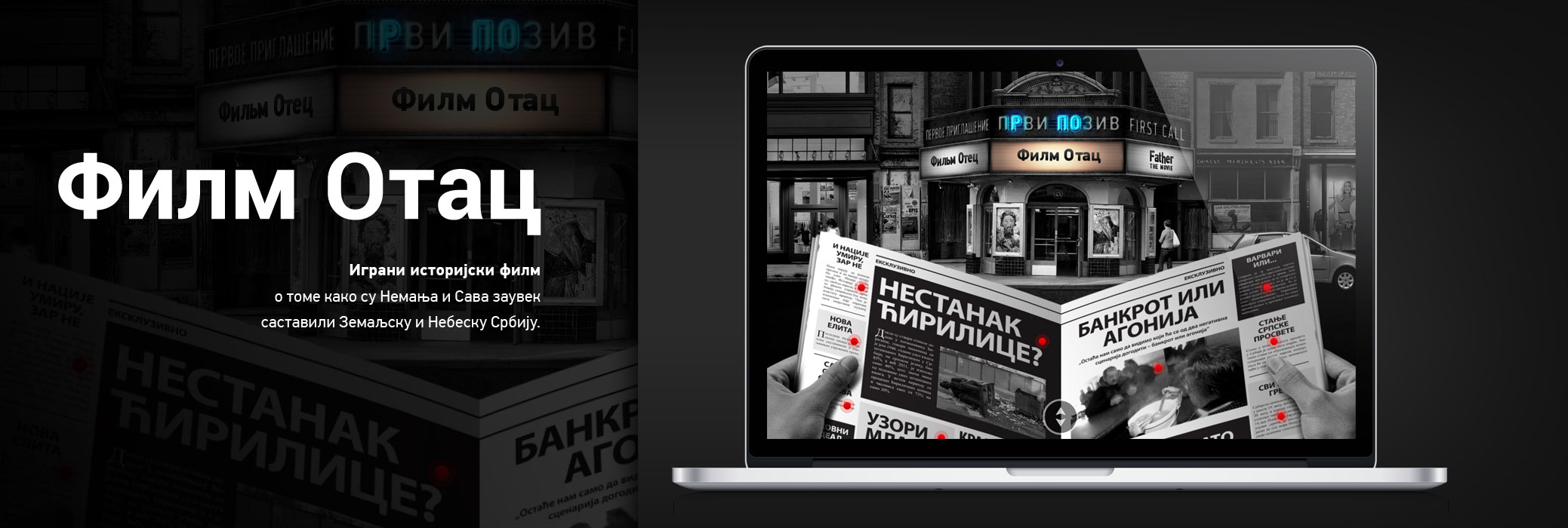SAINT NIKOLAI THE SERB
SAINT NIKOLAI THE SERB
Filming of the feature-length documentary about Saint Bishop Nikolai was initiated by an odd event. Pre-war trader Ljuba Saračević’s daughter Milica found a roll of film from year 1939 featuring the consecration of St. Nicholas church in Shilopai near Rudnik among her father’s inheritance. After a complex restoration it turned out that the film also contained valuable recordings of the bishop of Zhicha at that time, Nikolai Velimirović. The first people to have seen the recording on the old roll – members of the Administration of the Orthodox Church in Berlin – experienced this event as a sign. The initiative was started to implement the old recording as a part of a serious and above all interesting film made according to western standards, a film that would reveal to Serbian and global public alike a new and more complete outlook on the life of the greatest ecclesiastic preacher, how many used to call him, among those being the greatest church individuals of the 20th century. After many months of preparations, gathering materials, filming in multiple locations around the country and abroad and a fruitful cooperation with the Yugoslav Film Archive, a film that gathered an expert council consisting of orthodox bishops, professors of theology, and historians – was montaged and ready to begin its life before Serbian audience, as well as an audience of multiple countries of the world. SAINT NIKOLAI THE SERB was made to be a combination of a film language of similar western motion pictures and an Orthodox view of the world, and can thus be considered a true life of a saint on film.
Areas
Movies and TV
Client
Serbian Orthodox church municipality of Berlin
Crew
Deacon Nenad Ilić
Dragan Rakićević - Cile
Srdjan Klarić
Aleksandar Kostić
Year
2006
Film premiere:
March 14th 2006. 19.30. Belgrade, Sava Centre
Duration: 112 minutes
Screenplay and directing
deacon Nenad Ilić
Producers
Dragan Mitrovski
archpriest Dragan Sekulić
archpriest Veljko Gašić
Executive producers
Zoran Šćepanović
Miloš Šćepanović
Narrating actors
Goran Sultanović
Petar Božović
Milan Mihailović - Caci
Nenad Jezdić
Director of Photography
Dragan Rakićević - Cile
Montage
Srdjan Klarić
Composer
Aleksandar Kostić
Special effects and image processing
Filip Vojvodić
Choice of music
Nenad Ilić
Bratislav Petković
Sound design
Velibor Hajduković
Nebojša Zorić
Following the Belgrade premiere, the film had a premiere in Berlin, in Cinemax, and after that in many towns and cities in Serbia (on Kosovo and Metohija as well), in the region and in the diaspora centres. DVD edition which came out immediately after the Belgrade premiere was translated into six languages (English, Russian, German, French, Greek, Romanian), with the Bulgarian translation underway.



Announcement of premiere
If we observe the result after two whole months since the Belgrade gala premiere, we can conclude that the film has achieved great success and shown what can be done and the manner in which it can be done in the field of Orthodox culture, which is highly neglected. This great cultural venture has brought us not only the first filmed life of a saint, but also a strong motivation for other Serbian artists to create something similar and achieve the artistic quality and success of this film. “Saint Nikolai the Serb” film is an irrefutable piece of evidence that our tradition possesses great values which can be presented to the world, evidence that there are significant themes from our history that are suitable for modern artistic adaptation, that we have some extraordinary intellectuals who belong in the very top of Europe and the world, that we have great artists that know how to create an excellent artistic masterpiece according to all contemporary standards, and that our audience expects from our authors to finally turn to the motives from Serbian legacy. Therefore, this film surpasses the significance of solely an artistic accomplishment and becomes a program landmark of sorts in the area of national cultural politics. (ORTHODOXY, Belgrade)









